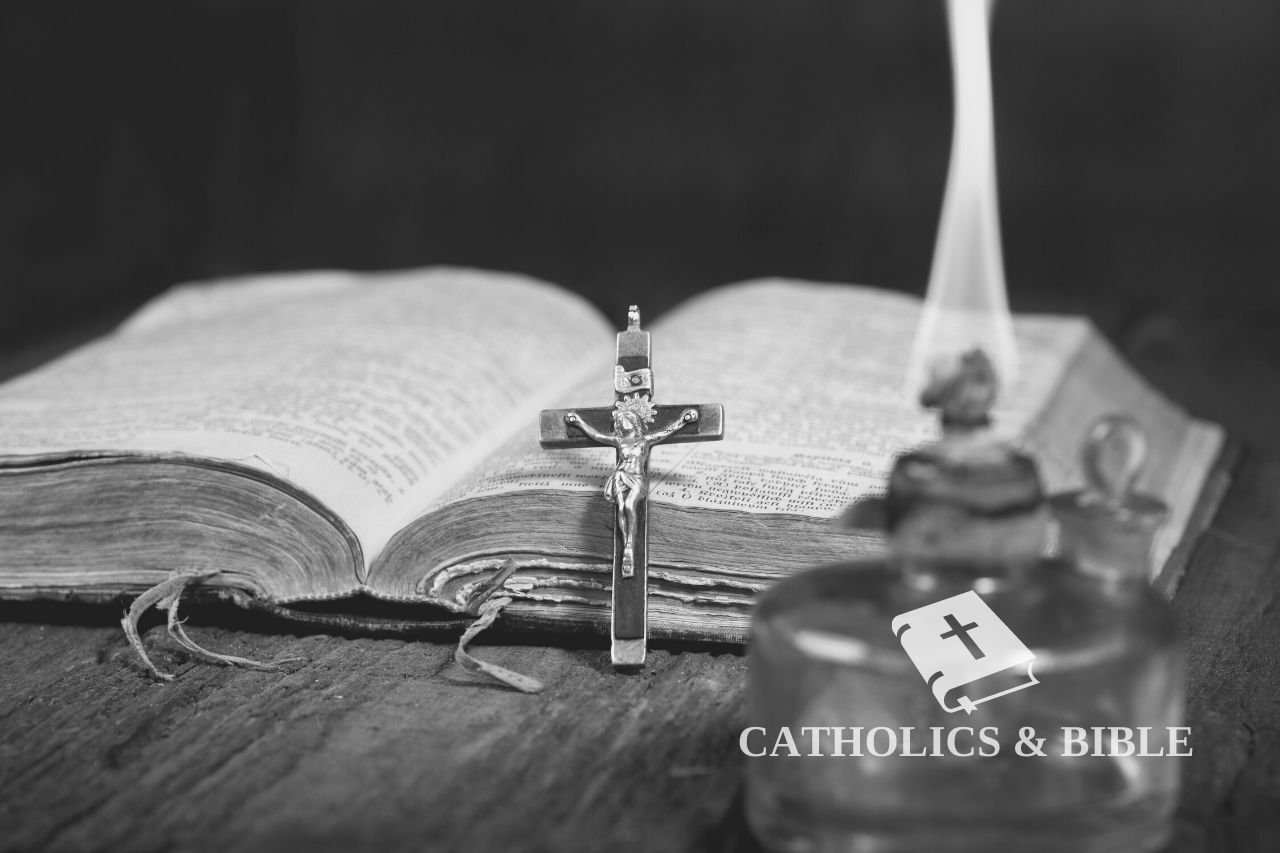Sirach is one of the deuterocanonical books in the Catholic Bible. It’s also called the book of Ecclesiasticus or The Wisdom of Jesus the Son of Sirach. It’s also the Greek name of the book’s author.
Sirach was authored by Ben Sira (Sirach in Greek) and contains ethical teachings on various matters like friendship, happiness, money, and death.
What You'll Learn Today
Is Sirach Part of The Catholic Bible?

Yes, Sirach is part of the Catholic Bible Canon. It’s one of the deuterocanonical books that are part of the Old Testament.
The Roman Catholic Church is one of four religious denominations that have Sirach and the other deuterocanonical books as part of their Bible.
The other three are the Eastern Orthodox Church, the Oriental Orthodox Church, and the Church of the East.
The Christian Bible used by protestant churches considers these books to be apocryphal or non-canonical and don’t refer to them for instruction.
Some Protestant Bibles will include these books in a separate section, usually between the Old and New Testaments, or at the end of the Bible.
But they are typically not used in Church teachings and services.
Interestingly, the Sirach and the other deuterocanonical books are also not part of the Jewish Bible, Tanakh, despite being part of the Old Testament.
That’s actually the main reason the Protestant Bible omits what Protestants call the apocryphal books.
During the reformation, when Protestantism came about, Protestants borrowed the Old Testament from the Jewish Bible (which is based on the Masoretic Texts) instead of the Septuagint version that the Catholic Church used.
And because the Jewish Bible did not include the deuterocanonical books, the Protestant Bible also omits them.
In contrast, the Septuagint version used by the Catholic Church had all these books.
Who Wrote Sirach?
Sirach is unique among Old Testament books in that it is signed by its author. The book of Sirach was written by Ben Sira, also known as Yeshua Ben Sirach.
Ben Sira was a scribe and writer who practiced Hellenistic Judaism (a religion that combined Jewish and Greek traditions).
Scholars think he authored the book between the years 180–175 BCE.
The book was originally written in Hebrew. It was later translated into Greek in Egypt by Sira’s grandson, who doesn’t sign the translation with his name.
What Is The Book of Sirach About?
Sirach is a book of wisdom, similar to other Old Testament books like Proverbs, Psalms and Ecclesiastes.
It contains exhortation and teachings on various aspects of life including family, friendship, and faith.
The book’s 51 chapters deal with a wide range of issues and matters that are difficult to categorize into neat themes.
There isn’t a clear structure to the book. Despite that, scholars have identified major topics in the book of Sirach.
The New Oxford Annotated Bible identifies 10 topics that include The Creation, Friendship, Honor and Shame, Death, and Women among others.
The best way to find out what the Sirach is all about is to read it yourself. If you have a Catholic Bible such as The New American Bible, you’ll find it inside.
You can also read the book of Sirach on USCCB’s website and at Catholic.org.
Ethical Teachings
The book of Sirach consists mostly of maxims and teachings.
Sira was a sage who was deeply rooted in Jewish custom and was learned in Jewish law. He was someone who could speak from a position of authority and experience.
The book addresses everyone in society, regardless of their station. This includes the rich and poor, parents, children, to masters, and to husbands and wives.
It talks in length about our relationships to each other as well as to God.
It combines teachings of everyday issues like shame, discipline, politeness and generosity with deep matters of faith.
You can read the book on its own or as part of your journey through the Old Testament or the books of wisdom.
Where In The Bible Can I Find Sirach?

First, make sure your Bible contains the deuterocanonical books. If it is an approved Catholic Bible, it’ll have these books.
If it’s another kind of Bible, it may be absent or grouped together with the apocryphal books in their own section.
USCCB has a list of books in the Catholic Bible by canonical order.
Sirach is part of the wisdom books that are in the Old Testament. It is right after the Book of Wisdom and before the start of the prophetic books, led by Isaiah.
A quick way to find it is to check the table of contents on your Bible. It’ll show you the page where to find Sirach.
Is Sirach The Same As Ecclesiastes?
Sirach is also called the book of Ecclesiasticus, which many people confuse with the book of Ecclesiastes.
Note the spelling of the two almost similar words.
Though they are both books of wisdom, Ecclesiasticus is distinct from Ecclesiastes.
Why Is Sirach Not In The Bible?
If you cannot find Sirach in the Bible, you are most likely holding a protestant Bible.
Protestant Bibles do not contain Sirach, nor do they contain any other deuterocanonical books.
The reason for this is that protestants regard these books as apocryphal, meaning of dubious or doubtful authenticity.
As we’ve already explained above, the Old Testament in the protestant Bible was adapted from the Jewish Bible, which did not contain the deuterocanonical books.
When it comes to the New Testament however, Catholic and Protestant Bibles are similar.
If you are shopping for a new Bible and want to make sure it contains the deuterocanonical books, your best option is an approved Catholic Bible, the best of which is the New American Bible.
Check out these additional translations approved by the USCCB (United States Conference of Catholic Bishops).
Many study Bibles like the The New Oxford Annotated Bible also contain the deuterocanonical books. They are typically grouped together in a separate section.
The book of Sirach is in the septuagint translated in 250 bc. Many dates of books in the bible have been given BAD DATES.
For example the book of Hebrews
1) The vocabulary used does not match any epistle by Paul the Apostle. (some year back the greek was analysed and found to differ from Pauls other epistles )
2) In the greek the writer implies the Apostles had died without the second generation faithfully writing all their teachings. This is in the verse “Let things slip” like a leaky vessel.
3) The book of hebrews is a Memorial written of the Priesthood and of the temple.
4) Again I find reference in latter chapters that the destruction of Jerusalem had occurred and that the Temple and Priesthood was removed forever. Fulfilling prophecy.
5) All accounts declare the Apostles Paul and Peter all died save John before 70 ad.
The Gospel of John was written close to 95 ad. John is reported by sources in 96 ad.
So in the gospel of John John provides scriptures of Christ teaching that Paul quotes from in 3 instances we have found so far. But nothing was recorded in the 3 earlier gospels.
How do we know? Because the single greek words and short phrases match the words Paul uses.
Just as Paul dozens and dozens of times quotes Christ from the three gospels by single greek words and short phrases in greek.
Just as Christ in the gospels including John uses single greek words and short greek phrase to show from the greek septuagint what verses and chapters he is teaching from.
We also found this in the Hebrew where the prophets and even david and solomon also use single hebrew words and short phrases to identify the older scriptures they use to verify every teaching doctrine vision dream . . .
And decade after we found this bit by bit we got a book about the septuatagint written by two rabbis that AFFIRM the prophets with no chapters and verses were quoting and citing older scriptures by key text words to identify passages. I could have danced after decades when I saw such a confirmation and they write that is holds true in the septuagint. that the prophers somehow cite and quote the same passages as they did in the Hebrew and Aramaic books in scripture.
So this is a law all through scripture For out of the mouth of two and three witnesses (Here of scriptures or Gospel and , , , or Epistle and gospel and scripture) shall every word be established.
This is the hallmark of when something is translated correctly from greek, or from Hebrew and Aramaic. there will be a minimum of 2 and 3 passages to a great multitude of witnesses of passages speaking of the same things with some of the same words.
Sirach is more important than you realize. Sirach is referred to over and over again by Jesus Christ, including the Lord’s Prayer. Wisdom is the most important theme that Jesus identifies Himself with over and over .